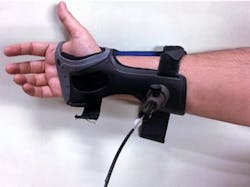Raman spectroscopy device detects glucose levels noninvasively
Researchers from the University of Missouri School of Medicine (MU; Columbia, MO) and the Massachusetts Institute of Technology (MIT; Cambridge, MA) recently evaluated the accuracy of spectroscopy technology to monitor blood glucose levels without needles or a finger prick. Early results show that the noninvasive technology measures blood glucose levels as effectively as a finger prick test, without drawing blood.
In a study, the research team measured the blood glucose levels of 20 healthy, non-diabetic adults prior to drinking a glucose-rich beverage. Blood glucose levels were then measured in intervals over the next 160 minutes using three methods: spectroscopy, IV blood test, and finger prick. The tests are designed to determine how much glucose remains in the blood and if a patient's insulin-regulating mechanisms are working effectively. The researchers found that spectroscopy predicted glucose values as accurately as a finger prick test.
"Currently, blood glucose levels are tested through a finger prick or intravenously. The approach we studied is noninvasive and uses a laser to monitor glucose levels in the skin," says Anandhi Upendran, Ph.D., director of biomedical innovations at the MU School of Medicine Institute for Clinical and Translational Science and co-author of the study.
Developed by researchers from MIT, the device uses a technique called Raman spectroscopy to measure the chemical composition of skin and extract the amount of glucose out of other skin compartments. A fiber-optic cable attached to a wristband passes laser light onto the skin to detect different components in the skin, such as fat tissue, protein, collagen, and glucose molecules. The shifts in wavelengths associated with glucose present in the blood creates a sort of molecular fingerprint that can be used to determine glucose levels.
The Raman spectroscopy blood-glucose monitor is shown. (Image credit: Massachusetts Institute of Technology)
"We were pleased to find that our initial results show Raman spectroscopy can measure glucose levels that are comparable to the finger stick devices," says Jeon Woong Kang, Ph.D., research scientist with MIT's Laser Biomedical Research Center and co-author of the study. "We hope that we can refine this method to be a noninvasive continuous glucose monitoring sensor."
With more testing, the researchers hope spectroscopy can become an alternative method to test glucose levels in patients in clinical care settings who are not capable of frequent blood draws and, one day, in other settings as the technology becomes smaller and more portable. Future studies will examine the accuracy of the technology in patients with diabetes.
Full details of the work appear in the journal Analytical and Bioanalytical Chemistry.

